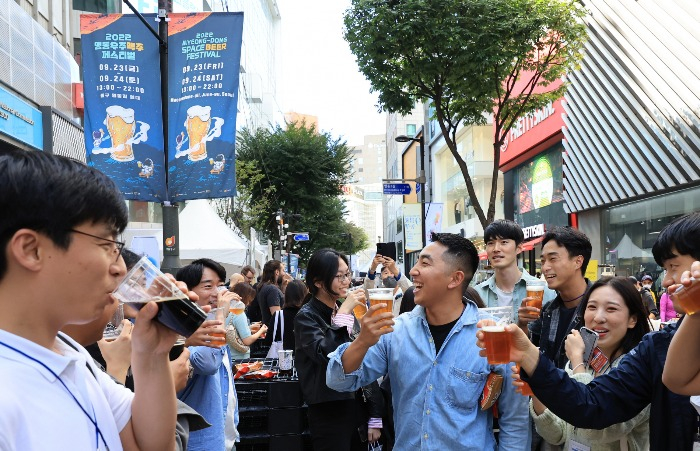
Craft beers and highballs from emerging breweries and distilleries are poised to disturb the South Korean alcoholic beverage market dominated by giant local and multinational brands thanks to their innovative taste ideas and brand stories that touch a chord with millennials.
It is now common for Koreans to spend a long time perusing stores' alcoholic beverage sections, now flooded with unusual craft beers, highballs and soju with quirky names like Yeonnamdong Sister -- a name that sounds foreign even to some Koreans.
But such outlandish names and unorthodox tastes are what young people, the so-called Zoomers and Millennials, embrace as cool, turning the Korean brew scene into a fierce battlefield between conventional major breweries and minority brewery startups in the country.
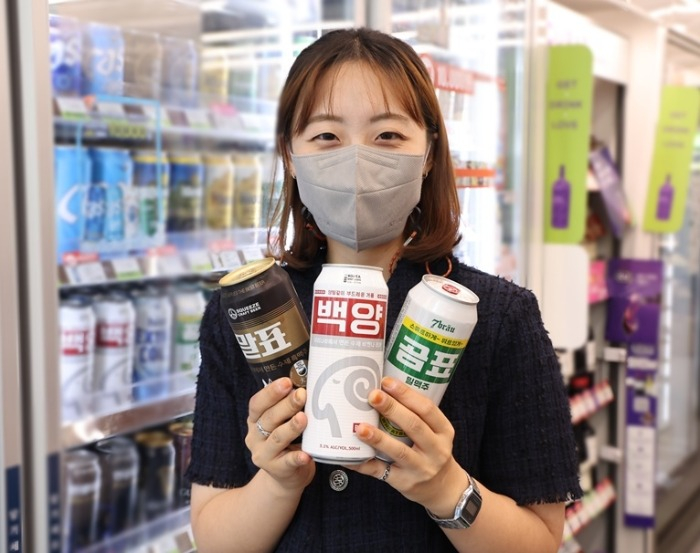
UNCONVENTIONAL BRANDING BY MICROBREWERIES
Seven Brau Co. based in Gangwon Province launched its Daepyo Wheat Beer in April, and the beer sold 410,000 cans in its first month. The word daepyo can mean CEO, leading, leader or representative in Korean, depending on the context.
The taste and ingredients in the Daepyo Wheat Beer are the same as those used in its pandemic smash-hit wheat beer jointly developed with Korean major flour firm Daehan Flour Co., using the flour company’s old corporate mascot with its distinctive white bear. About 60 million cans of that beer have been sold since its launch during the pandemic.
After the partnership with the flour company ended, the craft brewery renewed its package and name. Buoyed by positive reviews for its latest creation, the company plans to roll out more beers and highballs under the Daepyo brand to meet rapidly changing trends among young consumers.
Kabrew, a local microbrewery based in Gyeonggi Province, is famous for its craft beer Gyeongbokgung, selected as an official beer for a banquet hosted by the Korean presidential office.
On the strength of the company’s craft beer success, it is making inroads into the highball market.
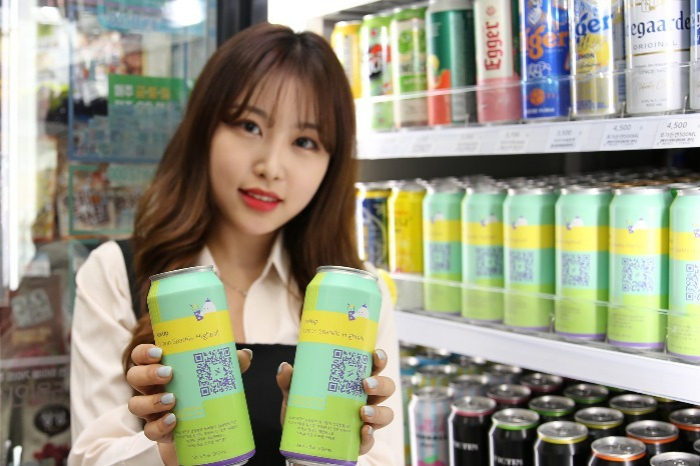
A highball is a strong alcoholic beverage with a spirit, normally whisky, mixed with a non-alcoholic drink. The canned highball market in Korea is burgeoning on strong demand from young consumers.
Local brewery Brewguru has teamed up with Korean AI technology startup Upstage to develop a new whisky cocktail drink, AskUp Lemon Sparkle Highball.
AskUp, a ChatGPT-powered Korean chatbot run by Upstage, joined the process of developing the drink’s taste and name, according to GS25, Korea’s largest convenience store chain that rolled out the special drink at its outlets across the nation in May.
“It took only an hour to develop AskUp Lemon Sparkle Highball after a series of conversations with AI,” said Brewguru Chief Executive Park Sang-jae. “This is the world’s first AI-made highball.”
SPROUTING REGIONAL BEER AND SOJU BRANDS
Growing demand for unique tastes and brands has led to the birth of many regional brewery startups, too.
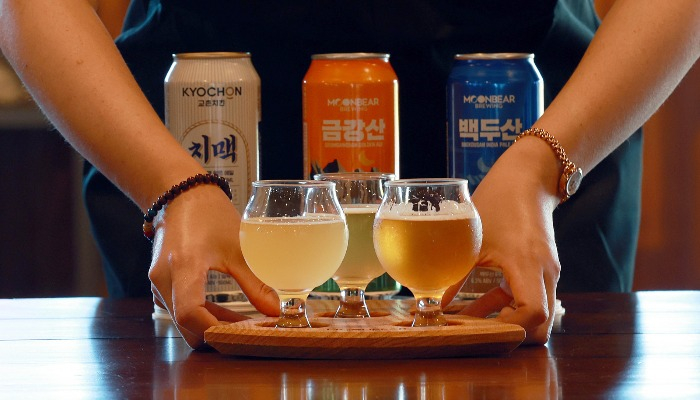
A local brewery startup, 2020company, formed by young entrepreneurs in Andong, North Gyeongsang Province, recently released a new craft beer, using locally sourced grain syrup and dried prunes.
The company explains its dark-colored craft beer tastes like Belgian beer, and it will roll out more seasonal beers for different seasons.
Andong is a rural town famous for having the most-well preserved folk village in Korea, with many traditional hanok houses and an emphasis on educating visitors on Korean traditional food and ceremonies.
Ulleung Brewery is another local brewery that is set up in Ulleung-do, a volcanic island 120 kilometers (75 miles) east of the Korean Peninsula. The island's pure drinking water is perfectly suited to beer, the taste of which hinges on water.
Its CEO moved from Seoul to the island where his grandmother lives to open the brewery.
Regional small breweries and distilleries gained further traction after popular Korean rapper Jay Park launched the sensational soju product Won Soju a few years back.
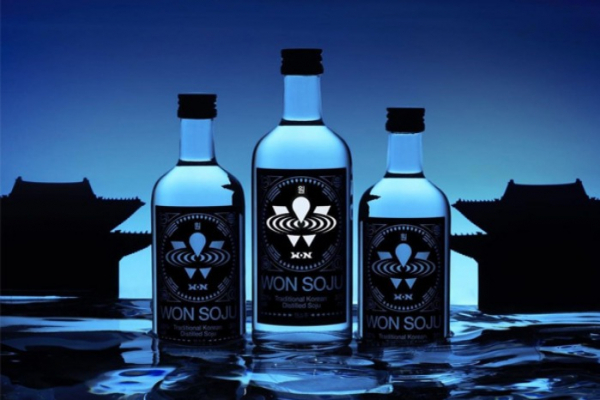
Soju is a clear rice-based distilled Korean spirit.
The popularity of Won Soju by Won Spirits, which has sold more than 5 million units since its launch, has contributed to the regional economy because it uses only one specific type of rice from Wonju, Gangwon Province, about 140 km east of Seoul, and has helped ease an oversupply of the rice in the region.
INNOVATION IN SPIRIT CURATION, RETAIL
Startups are also actively innovating in the alcoholic beverage curation and retail sectors.
Sooldamhwa runs a Korean traditional spirit subscription platform. It has partnered with Korea’s food commerce platform Wing Eat to operate a curation service that recommends food that best pairs with certain liquors.
Dailyshot, Dali and Kihya operate smartphone apps, through which consumers order alcoholic beverages and pick up their orders at offline restaurants and stores, like supermarkets and convenience stores, nearby their houses.
Dailyshot downloads have surpassed 1 million and it now partners with more than 1,700 retail outlets.
Dali’s monthly active users (MAU) rose 22%, while Kihya’s monthly order value jumped 25% since its launch in October last year.
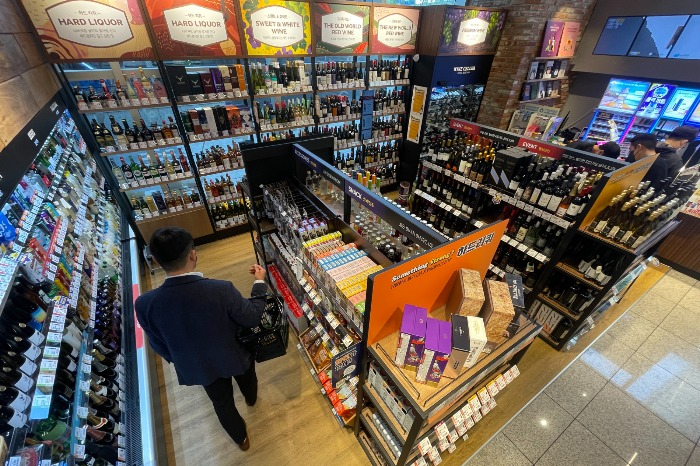
There are even startups upcycling byproducts of beer brewing and wine-making in Korea.
Korean food upcycling startup REharvest uses brewer’s spent grain (BSG), a byproduct of beer brewing, to make its "renergy" powder, an alternative to flour that is a main ingredient in its energy bars and protein balls.
The company said the renergy powder is rich in protein and dietary fiber but low in calories.
DECANT is a Korean startup recycling wine-making byproduct, grape pomace, to make cosmetics products and supplements. Grape pomace is very rich in antioxidants, with a higher percentage than in wine, the company said.
Write to Jung-Rak An at jran@hankyung.com
Sookyung Seo edited this article.
Bagikan Berita Ini














0 Response to "Craft brewery startups poised to revolutionize brew scene in South Korea - Korea Economic Daily"
Post a Comment